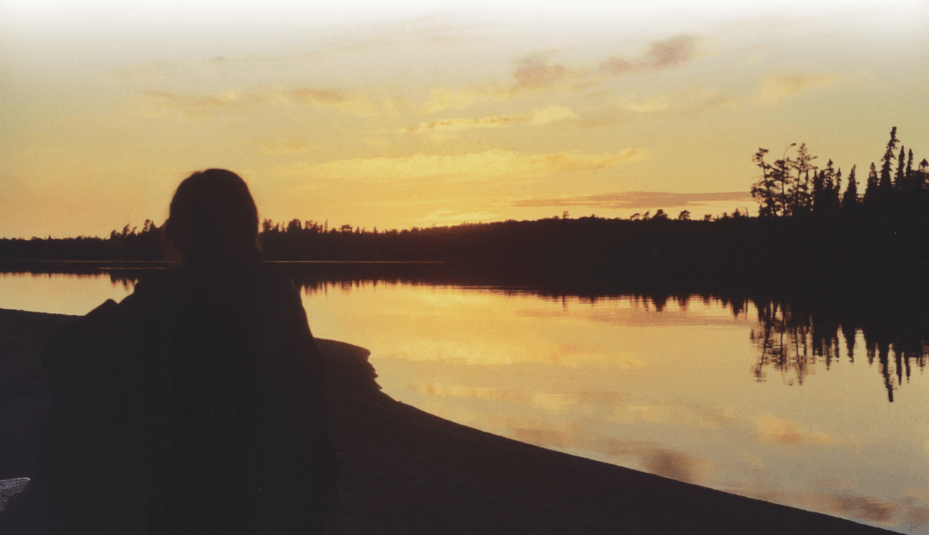When two paddles dip and swing in unison, their blades pushing the water, cutting through the air, droplets trickling in an arch as they return for another stroke, the movement of the canoe through the water is no longer just about advancing, but it is equally about being where you are. This synchronicity is telling, for it is a sign that the paddlers know each other, they are at ease, they have learned each other’s rhythm. It is one of the unique beauties of canoe tripping, to work and live together so closely, and to practice this intimacy daily in getting from one place to another. This intimacy is especially remarkable canoeing, for it also extends to the landscape. The activity is inextricable from its surroundings, and somewhere between the water, the canoe, the paddlers, and the sky, a bond is formed that resonates in each of the paddle’s passes.
There are many ways of a going on a canoe trip, but I first learned how to paddle and camp at ymca Camp Widjiwagan in 1995, and since then have spent eight more summers going on trail, whether for six days or six weeks, in the backyard Boundary Waters or above the Arctic Circle. For me paddling is epitomized in the image of a wood-canvas canoe slipping over a lake’s surface, its cedar insides gleaming, and two wood paddles, on either side of the canoe, flashing in the sunlight. I envision six women, all of them able and strong, faces creased from the sun and laughter, hands blackened and weathered from living out of doors. I have had the privilege of traversing many lakes with many companions, but this past summer I was lucky enough to guide one of Widjiwagan’s Explorer trips, and with five young women, aged between 15 and 17, I traveled through Canada and Minnesota for twenty-one days, making our way from Gulliver Lake, near Ignace, Ontario, to Lake Superior.
An Explorer trip is infamous for its challenges: 100 pound canoes, bushwhacking through waist-deep muskeg, 25 mile days with 11 portages, and an 8.5 mile portage to top it off. These obstacles functioned to bring our group together. Without each other we could not have made it up the cliff into Louisa Lake in the Quetico and we certainly could not have crossed the Grand Portage. They also can show each individual just how capable she is, facing mosquitoes and headwind and aching muscles, and yet nevertheless arriving safe in camp each night.
The energy my group and I expended this summer paid off in strong friendships and glowing memories, but the trip was not just about challenge. Being out for so long and working so hard enabled us to see much of the Quetico and the Boundary Waters. It was in the middle of these long days, winding Westerly along the river into Pickerel Lake or crossing Mountain Lake’s still waters, graced by the setting sun, our canoes perfectly doubled in their reflections, that I felt the power of our journey. I have long appreciated the boreal forest of this region, but after living amidst this land for 12 days, I began to see the tangled trees and exposed rock faces around me with fresh vision.
I felt utter gratitude to be able to know these woods so well, to be serenaded by the wind in the aspens, and guided by the sun. I realized that it was this familiarity itself that was such an amazing gift; that people, all over the world, could not even imagine such a place; that this way of life which felt so natural to me, could be absolutely inconceivable. Yet there I was, my feet soaked and my fingers calloused, gliding through the woods and waters, knowing the sound of my breath, the way my skin stretched and my muscles contracted. Woven between the sky, the shoreline, the water, and our canoes, I could feel the delicate bonds of interconnectedness tug and strain, reminding me they were there.
Realizing this sense of belonging, my gratitude expressed itself first in exclamations of joy. I would laugh and cry out in admiration unpredictably, recurrently struck, at random, by the spectacle around me. My happiness was so visceral. Moments later, though, the gracefulness of the canoes on the water and our adept movements would push me into reflection, and silence was the clearest way I could express my awe. For me, grace was not a question of religion or semantics; it was simply the only word that would come to mind in these quiet moments when landscape and paddler resided together.
As a 16 year-old camper traveling through the Quetico and the bwca I thought these parks were beautiful, but I valued them more for the setting they provided for my group and the challenges we faced, than I did as place of grace. As the years have passed, though, I have watched the land and myself with ever-increasing attention, and it is in this place that I have come to know myself as a physical being, and to know my thoughts as they unfurl in the unbounded quiet. I have seen the water be fierce and rollicking, and I have seen it be calm and inviting. I have observed the light on a cloudy day, when the sun’s progress cannot be seen in an arc, but in a subtle change of ambiance. I have learned that, like the sun in its constant, if invisible, course, I can continue, and even if only for a few moments a year, be at peace with all the questions and uncertainties I contain. Living in these woods, watching them and knowing them, I have felt an equilibrium that regardless of life’s vicissitudes, always brings me home.
– Laura Puckett
This article appeared in the Fall-Winter 2005 issue of Wilderness News


